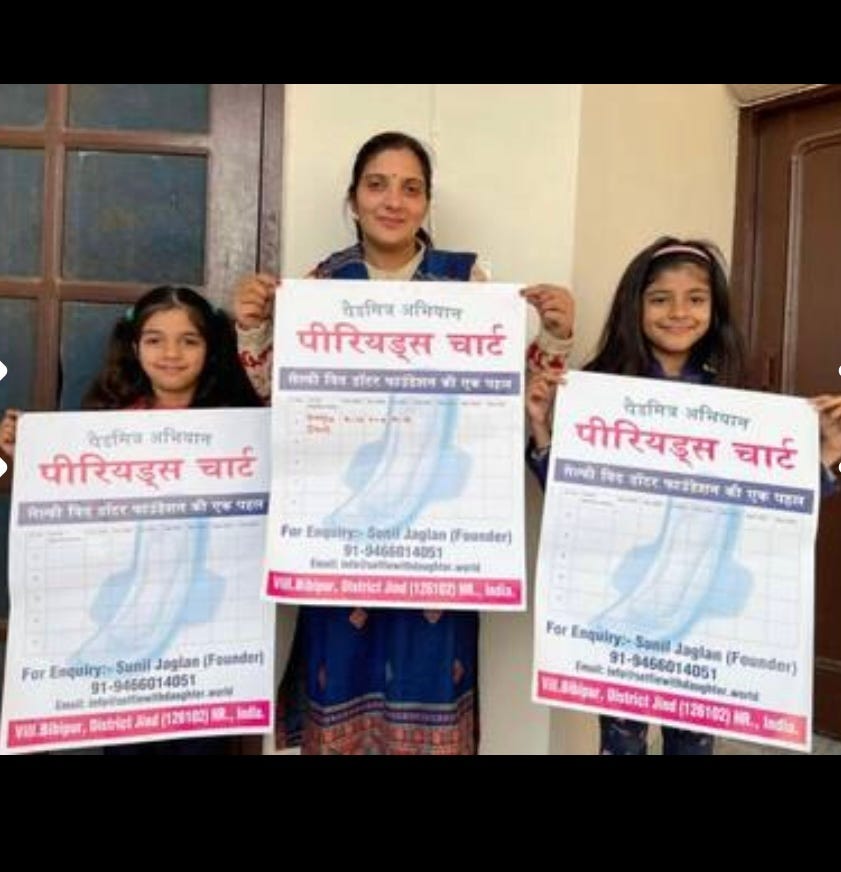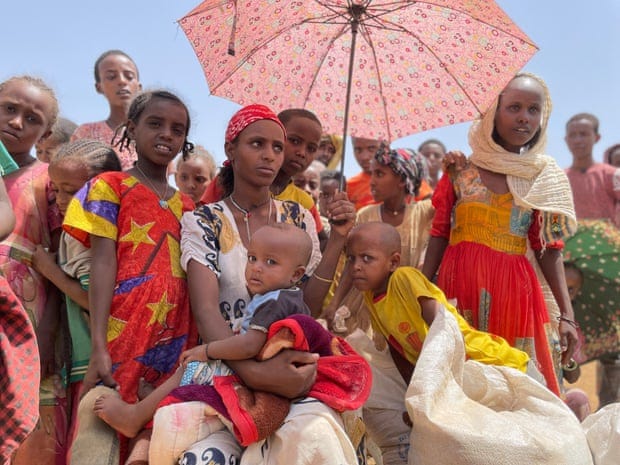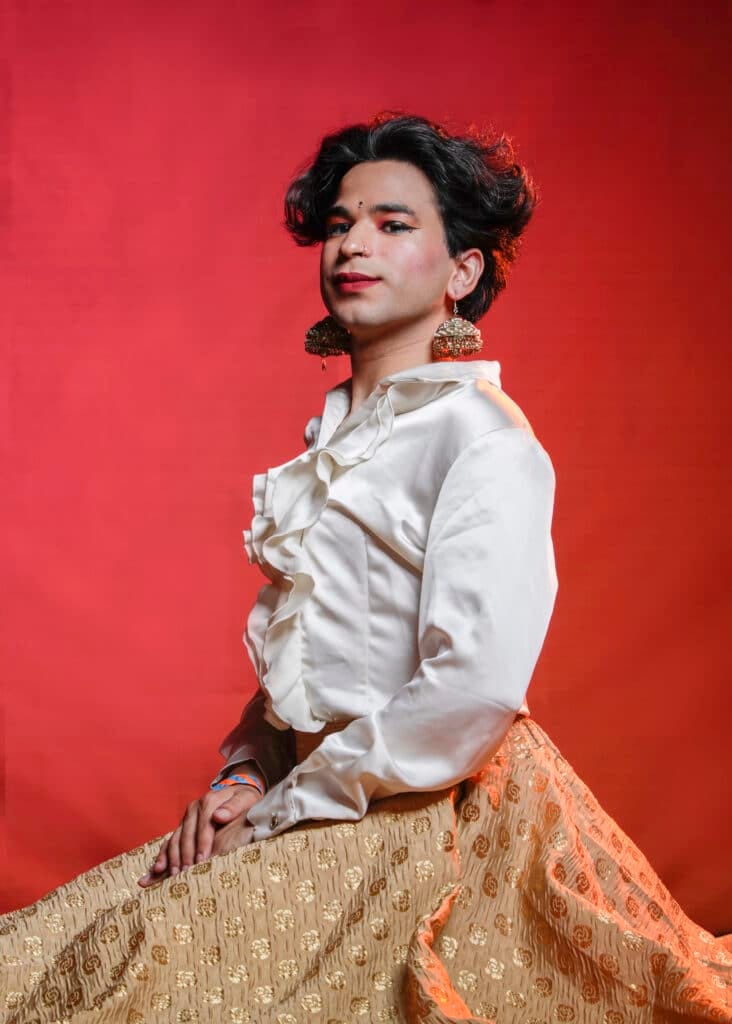Global Roundup: India Menstruators Fight Period Shame, Kenya Lesbian Footballers vs Right to Play, Tigray Women Forced Into Sex Work, Queer South Asian Representation, Migrant Women Share Stories
Curated by Samiha Hossain
Deepa Dhull posing with her daughters Yachika, 6, and Nandini, 9, holding period charts. Taniya Dutta for The National
33-year-old Supriya Verma says 35 homes in her village have women putting up their menstrual charts, which is leading to a much more open conversation on a topic that is generally discussed in hushed tones or not at all. Her family has become more considerate of her comforts and lets her sleep until late during her periods now.
The charts help us track whether our cycles are regular or not and if they are delayed or irregular, we can consult a doctor. This was not the case earlier. -Supriya Verma
Menstruating people in India still have to live under several restrictions – they are considered impure and are excluded from social and religious events, sometimes even their own kitchens. In some rural and tribal communities, women have to stay in separate menstrual huts when they get their periods.
Sunil Jaglan, the director of Selfie with Daughter Foundation, played a role in popularizing period charts in India. The campaign has spread to seven Indian states with around 1,000 women participating in it. Jaglan notes that many menstruators are initially met with resistance from their families when they want to put the charts up.
This is how we've been brought up. We feel shy even while buying sanitary napkins. There are myths attached to periods, women are not allowed to touch pickles or visit temples. It is difficult to make people understand that the pickle does not get spoiled if a menstruating woman touches it or the temple does not become impure. -Anju Panghaal
Jaglan is now holding online workshops for girls to make their own charts at home. He is also organizing gatherings of women where issues related to menstruation and women's health are discussed and information about sanitary napkins and menstrual cups are shared.
Members of the "Chosen Few" soccer team train during a practice match in Johannesburg April 29, 2010. The Chosen Few, launched in 2004 by the Forum for the Empowerment of Women (FEW), is South Africa's only lesbian soccer team, which is fighting not just for the ball but to overturn brutal prejudice and discrimination. Photo taken April 29, 2010. To match Feature SOCCER/LESBIANS REUTERS/Peter Andrews
In Kenya, lesbian footballer report widespread discrimination, harassment and career impacts.
Once Kenyan fans began gossiping about Imani’s sexuality, she faked an injury and went straight home, worried for her safety in a country where discrimination against LGBTQ+ people is rife and can lead to abuse including taunts, attacks and rape.
Those remarks got to me, and it wasn't just because I had been outed publicly. The spectator went on to announce ... that he knew my friends and even where I lived. -Imani
Around the world, lesbian and bisexual football players are at the forefront of top women's teams, unlike in the men's game where only a small number of elite players have come out. South Africa's Banyana Banyana team, which last month was crowned champion of the 2022 Africa Women Cup of Nations, is captained by lesbian Janine van Wyk. It is the continent's only national team to have any openly lesbian or bi players.
While women's football is gaining popularity in Kenya, stigma against LGBTQ+ people forces players to stay in the closet. Secrecy is the safest choice for Kenyan female footballers who harbour ambitions of playing professionally, internationally, or in the national Harambee Starlets team. Coaches do not speak up for lesbian and bi players who are being bullied over speculation that they are gay – and some even sexually harass them according to Imani.
Some LGBTQ+ women say football has helped them find others like them and create safe havens. Former amateur player and LGBTQ+ rights campaigner Anita Wanjiru founded a women's team in 2017. Though the all-lesbian team is organized through the Kenyan LGBTQ+ activist group Minority Women in Action (MWA), the team does not publicize the link and keeps the details of their sexuality a secret from the wider community.
Aisha, who plays for MWA, said the players have resorted to training themselves as no licensed coach will work with them. She said the team is also denied access to training grounds or sponsorship opportunities. For lesbian or bisexual women, the only way to progress in the league is to stay in the closet.
It is not easy being yourself and performing. Even though you are playing your best football, someone will still say something negative, something for people to start pointing fingers at you, and you could lose everything. -Imani
Photograph via The Guardian
Banking services and all communications have been cut off to the state by the Ethiopian administration since last year, with 6 million people denied access to their own money. In the absence of aid and banking, people had been largely relying on money from family and friends abroad to survive, but restrictions have been imposed on remittances by the Tigrayan authorities, and action against smugglers bringing money in has intensified at checkpoints.
Reports from inside Tigray say many women and girls are being forced to turn to sex work to survive while others suggest there has been an increase in suicide.
When the Tigray rebel forces returned to power a year ago, after nearly eight months of fighting with Ethiopian federal forces, Hewan thought life might improve. Food had never before been an issue for the 16-year-old and her family, who had a good life, she said.
Now I am hungry. My parents and siblings are hungry. For months, we waited in vain to receive aid. Relatives abroad had been sending us money through smugglers. But it is tough to find remittance smugglers these days. Those we knew are no longer operating. We sold every property we had. There is nothing to eat at home. So, I went to the street to sell my body. What option do I have? -Hewan
Smugglers blame Tigray authorities for systematically putting them out of operation by setting up border posts with officers who restrict, block and confiscate remittances, which have already been made illegal by the Ethiopian government. They describe harassment, criminalization, unpredictable restrictions on the amount of money one can carry into Tigray, and confiscation of money intended for hungry people. Others accused Tigray authorities of confiscating the money for themselves at the checkpoints.
Image by Shane Anthony Sinclair/Getty via Pink News
The fluidity that dance offered really helped inform my own fluidity and allowed me to appreciate the expanse that comes with life, outside the rigid systems we have, not just the binary system but the pressures that society puts onto us. -Shiva Raichandani
While dance gave Raichandani the tools to explore their gender identity, it was not until later in life they discovered the words to describe it. Outside of dance, Raichandani found “small pockets” of representation within South Asian culture. They found themselves in the song and dance of Bollywood actresses and the gender fluidity of Hindu deities. Although Shiva believes in the powerful impact of this representation, at the end of the day they say “no one can truly represent you but yourself”.
After moving to the UK, Shiva discovered the UK’s only pan-Asian drag cabaret collective, The Bitten Peach. Coming from a traditional dance background that was often structured, The Bitten Peach took the rulebook and “ripped it to shreds”. It soon became the subject of their first documentary, Peach Paradise, commissioned by Netflix.
To enter this space where you’re queering it and bringing South Asianness to the forefront, but still challenging the toxicities outside and within the Asian communities? There was a very political nature to the art we were performing. -Shiva Raichandani
While Peach Paradise does explore the racism and transphobia faced by the cabaret group, at its core it centres on queer joy. And this was very much the theme they took into their first feature film, Queer Parivaar. It is a tender and joyful exploration of intergenerational South Asian culture and queerness.
Raichandani looks forward to the future of queer South Asian art and believes in going beyond “sadness and death and violence and trauma” and also showcasing queer people being happy, thriving and the complexities of different emotions. As Raichandani looks forward to future projects, with another documentary coming out later this year, they sum up what being South Asian and queer means to them:
A celebration of life. There’s so much vibrance and joy to be found in being South Asian and the expanse that queerness offers put into perspective how, in so many ways, we celebrate all that life has to offer. -Shiva Raichandani
Credit: Supplied by Grace Panlican/myTIA via SBS
One of the programs that Saxena and Corda initiated is “Tongue Set Free,” a workshop initially conducted online during the pandemic with the purpose of connecting migrant women. The program allowed women to come together and write their stories. There are Arabic, Mandarin, Filipino, Spanish and Sinhalese writing groups now. Although the workshop stories were varied and were written in different languages, home was a common theme in all of them.
Every woman spoke about their childhood very fondly. They remember the kitchen in their homes, their mothers and grandmothers. They also remember the food and smells. -Novela Corda
Western Sydney resident and myTitas in Australia (myTIA) co-founder Grace Panlican was one of the participants in the English story writing workshop. Her story revolved around her hometown of Tarlac and her experience as an international student in Australia.
I pulled through my story from my hometown in Capas, Tarlac. I was reminded of my humble beginnings and linked that to my migration to Australia.
It's quite different when you're telling your story to when you write it where you are able to go back through each word. We're always looking for connection to our homeland. That special feeling of being able to relive where I came from and be able to freely write about it. -Grace Panlican
In celebration of Philippines' Buwan ng Wika (Language Month), myTIA will hold a “Tongue Set Free in Filipino” workshop. Panlican wishes to read and hear the stories of other Filipino women in their workshop, which she believes will help "our family back home as one of the main commonalities in many Filipino migrant stories."
Samiha Hossain (she/her) is a student at the University of Ottawa. She has experience working with survivors of sexual violence in her community, as well as conducting research on gender-based violence. A lot of her time is spent learning about and critically engaging with intersectional feminism, transformative justice and disability justice.
Samiha firmly believes in the power of connecting with people and listening to their stories to create solidarity and heal as a community. She refuses to let anyone thwart her imagination when it comes to envisioning a radically different future full of care webs, nurturance and collective liberation.







Repeating Mona's headline - I'm going to underwrite some subscriptions to FEMINIST GIANT while she has the comments open to non-subscribers so they can request a paid subscription (I think you'll have to put your email address in so you can be subscribed?).
In Solidarity, Ruth Ann Harnisch